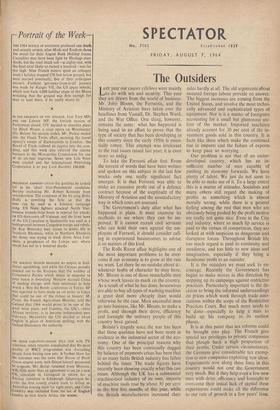The Outsiders
1As"' year our causes celebres were mainly d I to do with sex and security. This year they are drawn from the world of business.
Mr. John Bloom, the Ferrantis, and the Ministry of Aviation have taken over the headlines from Vassall, Dr. Stephen Ward, and the War Office. One thing, however, remains the same : what has happened is being used in an effort to prove that the type of society that has been developing in this country since the early 1950s is essen- tially rotten. This attempt was irrelevant to the real issues raised last year; it is even more so today.
To take the Ferranti affair first. From the torrent of words that have been written and spoken on this subject in the last few weeks only one really significant fact emerges. It is that Ferranti was able to make an excessive profit out of a defence contract because of the ineptitude of the Ministry of Aviation and the unsatisfactory way in which costs are assessed.
The Government's duty after what has happened is plain. It must examine its methods to see where they can be im- proved. If it cannot recruit civil servants who can hold their own against the em- ployees of Ferranti, it should consider call- ing in experienced businessmen to advise it on matters of this kind.
The Rolls Razor affair highlights one of the most important problems to be over- come if our economy is to grow at the rate we want. Let there be no mistake about it: whatever faults of character he may have, Mr. Bloom is one of those remarkable men whose work leaves its mark on the country.
As a result of what he has done, housewives are able to buy all types of washing machine a great deal more cheaply than would otherwise be the case. Most successful men go into business, like Mr. Bloom, to make a profit, and through their drive, efficiency and foresight the ordinary people of this country have gained.
Britain's tragedy since the war has been that these qualities have not been more in evidence in the industrial sector of the eco- nomy. One of the principal reasons why this country has been continually dogged by balance of payments crises has been that in so many fields British industry has fallen behind the times. The trade figures have recently been showing exactly what this can mean. Although the UK has a substantial machine-tool industry of its own, imports of machine tools rose by about 30 per cent in the first five months of this year, while the British manufacturers increased their sales hardly at all. The old arguments about sweated foreign labour provide no answer. The biggest increases are coming from the United States, and involve the most techni- cally advanced and sophisticated types of equipment. Nor is it a matter of foreigners accounting for a small but glamorous sec- tion of the market. Imported machines already account for 30 per cent of the in- vestment goods sold in this country. It is facts like these which make the continued rise in imports and the failure of exports to keep pace so worrying.
Our problem is not that of an under- developed country, which has an in- sufficient number of men capable of pushing its economy forwards. We have plenty of talent. We just do not seem to be able to make use of it. To a large extent this is a matter of attitudes. Socialists and many others still regard the making of profits as something which is almost morally wrong, while there is a general feeling among the rest that men who are obviously being pushed by the profit motive are really not quite nice. Even in the City and industry, where so much lip service is paid to the virtues of competition, they are looked at with suspicion as dangerous and disruptive forces. Throughout British life too much regard is paid to continuity and steadiness, and too little to new ideas and imagination, especially if they bring a handsome profit to an outsider.
It is the outsiders we must seek to en- courage. Recently the Government has begun to make moves in this direction by stepping up its campaign against restrictive practices. Particularly important is the de- cision to bring the informal understandings on prices which work through trade asso- ciations within the scope of the Restrictive Practices Court. But much more needs to be done—especially to help a man to build up his company in its earliest phases. It is at this point that tax reforms could be brought into play. The French give special tax privileges to private companies that plough back a high proportion of their profits. Under certain circumstances, the Germans give considerable tax exemp- tion to new companies exploiting new ideas. Experiments now along these lines in this country would not cost the Government very much. But if they help even a few new men with drive, efficiency and foresight- to overcome their initial lack of capital these experiments could make all the difference to our rate of growth in a few years' time.






























 Previous page
Previous page